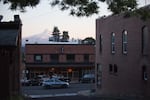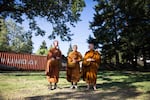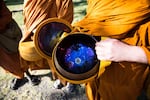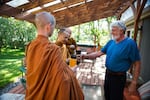A small house and a few huts sit at the end of a potholed gravel road in the Columbia River Gorge. Trails wind through the forest past trees and rocks covered in electric green moss.
Mountain bikers occasionally zoom up and down the forested trails. A ranching family lives next-door.
Serene and secluded, this place is unfathomably quiet.
It’s perfect for the forest-dwelling Buddhist monks who call it home. Their hermitage is far enough removed for the monks to practice in solitude.
But it remains close to town. It has to. The monks are alms mendicants. That is, they eat only what they’re freely given.
The monks cannot ask for food or store excess. They cannot possess or use money. They cannot farm.
This tradition puts the monks of the Gorge among an extremely limited few in North America.
“We live dependent on the support of people offering, out of a sense of goodwill or inspiration, the necessities of daily life,” said Ajahn Sudanto, abbot of the Pacific Hermitage in White Salmon, Washington.
It's a lot to ask of any community — especially in a country where monasticism (i.e. monks and nuns) isn't very visible.

In White Salmon, Washington, the café serving vegan lunch is across the street from the glass-blower, which is just a few steps away from the yoga studio where the monks hold community meditation.
Bradley W. Parks / OPB
Jill Davis regularly contributes food to the monks on alms round. She said they bring a “sense of goodness” to White Salmon. The monks offer the community free weekly meditation at the yoga center in town and Buddhist teachings to anyone who seeks them.
For about eight years, this small hermitage has found the support it needs to survive in the Gorge. And that’s largely because its supporters see benefits in return.
“It’s remarkable that White Salmon has this group of people and something that’s really established,” Davis said. “It feels really comforting to me.”
‘Walking Our Talk’
On a warm Tuesday in May, sun knocked aggressively at the forest canopy, beckoning Sudanto and the monks of the Columbia River Gorge. It was before 7 a.m. Mother Nature had just turned the volume on.
Clad in orange robes, three monks padded across the wooden deck down to a well-swept forest trail in silence, single file. They carried big steel bowls wrapped in crochet.
The monks walked into town to collect food from lay supporters, as they do every morning. This alms round is how they obtain their one daily meal, which must be consumed between dawn and noon.
“It’s not just a game or an empty ritual,” Sudanto said. “In some sense, we’re walking our talk.”

From left, Tan Sampanno, Ajahn Kassapo and Ajahn Sudanto make their morning alms round through White Salmon.
Bradley W. Parks / OPB
The rules are part of the Thai forest tradition, which the monks follow. It's an expression of Theravada Buddhism with a heavy focus on disciplined meditation as a path to enlightenment.
The Thai forest tradition champions spiritual wandering and renunciation of material possessions and worldly pursuits.
Their belief is that “all avoidable human suffering is caused by mental defilements, and that these defilements can be completely avoided by a systematic education of body, speech and mind,” according to texts distributed by monks of this tradition.
Rules are designed to help monks eliminate stresses, desires or “defilements.”
So they get help from outsiders. Colleen Regalbuto helps coordinate food offerings for the monks in White Salmon. On alms round each morning, the monks’ stops are predetermined, so they have some sense of security.
If people don’t give, the monks don’t eat.
Regalbuto said she thinks the monastery’s survival speaks to the generosity of White Salmon.
“I think it’s just inspiring for people to see these people who focus their lives on cultivating compassion and kindness … who exist to lead a life of contemplation and service,” she said.

Ajahn Sudanto displays the inside of his alms bowl. He likens the interior to a starry night.
Bradley W. Parks / OPB
Luang Por Pasanno co-founded the California-based parent monastery of Pacific Hermitage. The monks’ experience and expertise, Pasanno said, must be beneficial to the lay community to last. Complete isolation isn’t an option.
“Our whole life is devoted to learning how to live together and to integrate the practice of, say, moral precepts and integrity with our daily life,” Pasanno said.
Mindfulness and meditation are having a moment in the age of connectivity. That’s not lost on the monks.
They try, Pasanno said, to give Buddhists and non-Buddhists as much opportunity to “plug in” to their teachings to apply them if and how they want.
The White Salmon hermitage has an internet connection. Many monks use email and try to at least stay aware of what’s happening in the wider world.
“Because otherwise it’s just either empty philosophy or just empty rules, and it’s not useful or acceptable to our daily life,” Pasanno said. “The Buddha’s teachings are very much about how we live it as opposed to what we believe in.”
Why White Salmon?
By mid-morning, the sun was beating down on the monks as they wrapped up their alms round. Starting their quiet descent down the Spring Street hill, a woman approached from the opposite direction. She threw up her hand in a wave.
“Jesus loves you guys,” she said without stopping.
The monks kept their eyes straight ahead. “Thank you,” Sudanto said quietly.
Interactions like that, Sudanto said, are uncommon but not unheard of.
Less than 1 percent of Americans identify as Buddhist. The Pew Research Center lists Washington as one of the least religious states in the country.
Though the monastery has thrived since it established in White Salmon, some still express fear of the monks.
“You get yelled at and a certain amount of verbal abuse. But that’s ordinary. I mean, you’re strange,” Pasanno said, laughing. “Human beings treat things that are strange in strange ways sometimes.”
White Salmon is a city of about 2,500 people. It's not far from Wasco County in Oregon — Sudanto heard some people thought the monks were Rajneeshees when they first moved in.
But he said they mostly receive waves, the añjali or, at the very least, quiet tolerance.

Ray Klebba, right, hands tea to Ajahn Kassapo on alms round. Klebba and his partner, Shelley Baxter, contribute food to the monks throughout the week.
Bradley W. Parks / OPB
Sudanto understands some of the confusion the monks elicit in the Gorge. He grew up Catholic in Vancouver, Washington.
“Somehow even then I had no conception that monks and nuns were still things that existed in the world,” he said.
He said he took interest in Buddhism while at the University of Oregon. In an effort to learn meditation, he traveled to India and Thailand after graduation, taking notice of how monastic life fit into communities there.
That’s part of why he wanted to help establish a monastery in the Northwest. To him, the philosopher or the monk plays an important role in a holistic community.
“The dress, the guise, the lifestyle is part of holding that space in a communal and a public way,” Sudanto said, “as a reminder of that part of the human experience and how human societies value that experience.”
And in White Salmon, monks have found a community that values that experience enough to keep it around.
Editor's note: This story uses the honorific titles "Ajahn," "Tan" and "Luang Por" for clarity.

